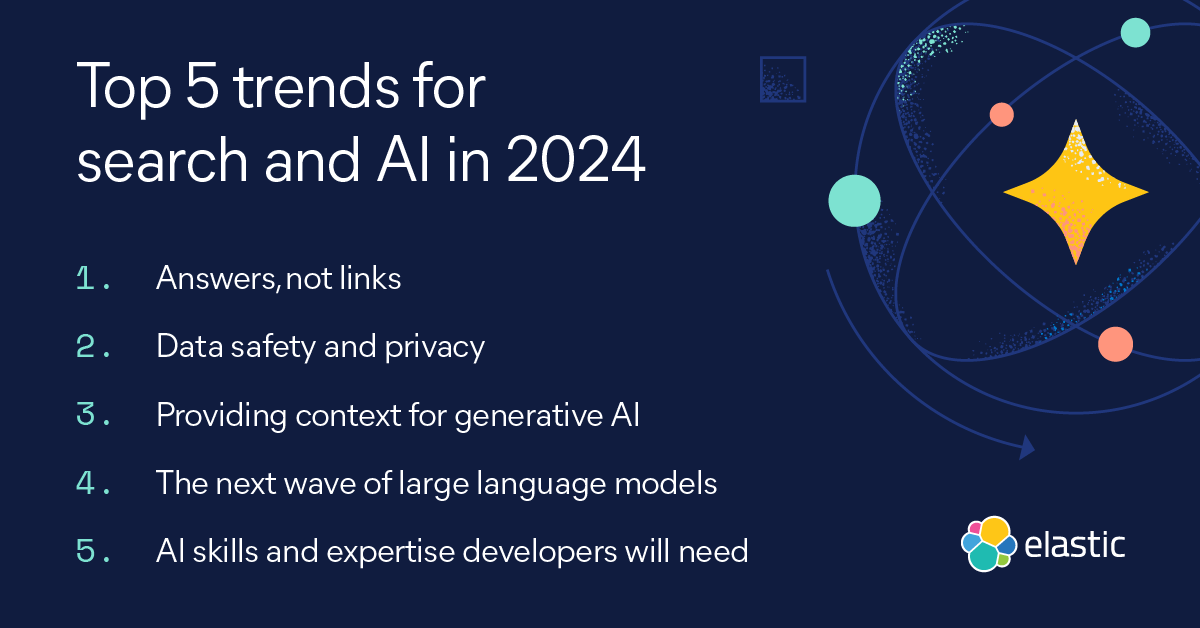Cinco tendências de busca de IA que afetarão os desenvolvedores em 2024

Depois de um 2023 que passou muito rápido, o que o futuro reserva para a IA e a busca? A IA conversacional generativa chegou ao conhecimento público no ano passado, e as organizações se esforçaram para definir a estratégia para capitalizar com a tendência. A relevância impulsionada pela IA está reformulando a maneira como os usuários experimentam a busca e elevando as expectativas quanto à qualidade da interação.
Em uma discussão recente com líderes de produto e engenharia da Adobe, Hugging Face, You.com e Elastic, avaliamos o estado atual da busca e avaliamos essas tendências alimentadas por IA. Veja alguns temas-chave que eles veem no horizonte para tudo o que estiver relacionado à IA em 2024:

Quais são as principais tendências para busca e IA em 2024?
1. As expectativas do usuário em rápida evolução para busca
A busca baseada em palavras-chave com páginas e mais páginas de resultados é algo bem 2023. A partir de 2024, os usuários esperam experiências que entendam melhor as consultas de linguagem natural e ofereçam respostas diretas. A busca vetorial e os LLMs estão ajudando os desenvolvedores a criar recursos de busca reimaginados, onde listas de links estão sendo substituídas por uma resposta prescritiva, incluindo experiências de conversação interativas. Respostas, e não links azuis, é a direção que a busca está tomando.
2. Segurança e privacidade de dados
Proteções de dados, políticas de privacidade e processos sólidos de proveniência e governança de dados sempre foram prioridade no passado, mas se tornaram cada vez mais importantes na era da IA. As implicações legais, as considerações de propriedade intelectual para modelos de treinamento, práticas de proteção de dados organizacionais e proteções de usuários serão questões polêmicas.
O dilema ético que todos conhecemos sobre a IA é que ela não deve ser tendenciosa, então você tenta usar fontes confiáveis para treinar seus dados. Mas essas fontes confiáveis, conforme evidenciado pela ação judicial do New York Times, têm um custo. E como podemos padronizar isso? Se acreditarmos nos números, o custo do licenciamento desses artigos será, na verdade, muito maior do que o custo de gerar modelos de base.
Fahd Siddiqui, Diretor de Engenharia da Adobe Commerce
3. Contexto adequado para IA generativa
As capacidades generativas dos LLMs são notáveis. No entanto, alucinações, dados de treinamento desatualizados e falta de contexto adequado apresentam desafios ao criar experiências interativas úteis. Melhorias na geração de texto de IA com técnicas como geração aumentada por recuperação (RAG) podem fornecer aos LLMs um contexto crítico específico do domínio a partir de dados proprietários.
. . . o que a geração aumentada de recuperação faz é dar base a esses LLMs e oferecer contexto adicional para ajudá-los a atender às necessidades de informações do usuário. Acredito que a RAG continuará sendo uma grande tendência em 2024.
Raj Arasu, Engenheiro de software sênior, You.com
4. A próxima onda de LLMs
É provável que 2024 traga outra enxurrada de novos modelos de linguagem, conjuntos de dados abertos e aplicativos de machine learning. Você verá ainda muitos modelos que são ainda mais eficientes e mais adaptados a todos os tipos de problemas comerciais específicos.
5. Expertise em IA
Quais são os conjuntos de habilidades necessários para um futuro movido pela IA e quais são as ferramentas que complementarão essas habilidades? Sem dúvida, uma base sólida no conhecimento básico de IA é importante. Mas com os avanços vertiginosos da IA, juntamente com dezenas de novas ferramentas, o mesmo acontece com a mentalidade de aprendizado contínuo.
...para realmente cumprir a promessa da IA, precisamos alcançar os desenvolvedores e capacitá-los, oferecendo as ferramentas para criar a própria IA sem precisar ter um diploma formal em aprendizagem profunda ou depender de serviços externos que são uma caixa preta para os sistemas.
Jeff Boudier, Chefe de Produto e Crescimento, Hugging Face
Fique ligado(a) para saber mais
Quer saber mais sobre essas tendências? Seja você um desenvolvedor de busca experiente interessado em se manter à frente da concorrência ou um entusiasta da IA ansioso por saber o que vem por aí, participe do nosso evento virtual para ter mais informações valiosas, dicas práticas e uma compreensão mais profunda das tendências técnicas que estão moldando a busca e o ecossistema em 2024.
Você verá nosso painel de especialistas convidados do setor, cada um com uma perspectiva única sobre como projetar e criar uma busca de nível internacional (e as ferramentas que tornam essas experiências possíveis):

Conheça os diferentes métodos para criar aplicações de busca com IA.
O lançamento e o tempo de amadurecimento de todos os recursos ou funcionalidades descritos neste artigo permanecem a exclusivo critério da Elastic. Os recursos ou funcionalidades não disponíveis no momento poderão não ser entregues ou não chegarem no prazo previsto.
Neste post do blog, podemos ter usado ou nos referido a ferramentas de IA generativa de terceiros, que pertencem a seus respectivos proprietários e são operadas por eles. A Elastic não tem nenhum controle sobre as ferramentas de terceiros e não temos nenhuma responsabilidade por seu conteúdo, operação ou uso, nem por qualquer perda ou dano que possa surgir do uso de tais ferramentas. Tenha cuidado ao usar ferramentas de IA com informações pessoais, sensíveis ou confidenciais. Os dados que você enviar poderão ser usados para treinamento de IA ou outros fins. Não há garantia de que as informações fornecidas serão mantidas em segurança ou em confidencialidade. Você deve se familiarizar com as práticas de privacidade e os termos de uso de qualquer ferramenta de IA generativa antes de usá-la.
Elastic, Elasticsearch, ESRE, Elasticsearch Relevance Engine e marcas associadas são marcas comerciais, logotipos ou marcas registradas da Elasticsearch N.V. nos Estados Unidos e em outros países. Todos os outros nomes de empresas e produtos são marcas comerciais, logotipos ou marcas registradas de seus respectivos proprietários.